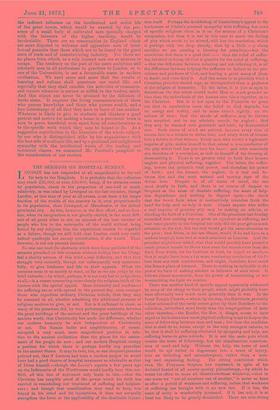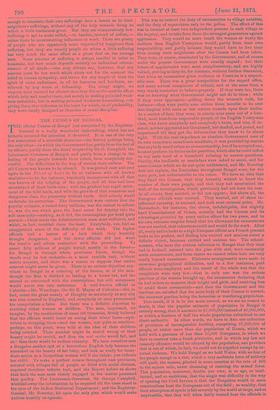THESERMONS ON HOSPITAL SUNDAY.
No one can read the abstracts which have been published of the sermons preached on this occasion without feeling that the Clergy feel a charity sermon of this kind a real difficulty, and that they struggle very earnestly, though not unfrequently very unsuccess- fully, to give freshness and life to their appeals. What the sermons seem to us mostly to want, so far as we can judge by the brief extracts,—by which, perhaps, it is not very fair to judge them at all,—is a reason connecting more closely the religious faith of the hearers with the special appeal. Mere humanity and tenderness for suffering are so wide-spread in the present day, even amongst those who repudiate ordinary Christian beliefs, that they may be assumed in all, whether admitting the additional pressure of religious motives to give, or not. Nor is it sufficient to show, as many of the preachers did, by very picturesque contrasts between the great buildings of the ancient and the great buildings of the modern world, that Christianity has made the difference, whether our modern humanity be now independent of Christianity or not. The Roman baths and amphitheatres, of course, occupied a very much more magnificent position in rela- tion to the ancient civilisation than the places for the amuse- ment of the people do now ; and our modern Hospitals occupy a position for which there is perhaps hardly any precedent in the ancient States. It may be true, too, as one eloquent preacher pointed out, that if Lazarus had been a modern pauper he would have had a good chance of hospital treatment as admirable as that of Dives himself,—though the Lancet's reports a few years ago on the Infirmaries of the Workhouses would hardly bear this out. Still, all this line of argument only leads to this,—that the Christian has tangible proof of the power which his faith has exerted in remodelling our treatment of suffering and helpless- ness; and though that consideration may tend to keep him happy in his creed and its injunctions, it does not naturally strengthen the force or the applicability of the charitable injunc- tion itself. Perhaps the Archbishop of Canterbury's appeal to the tenderness of Christ's personal sympathy with suffering has more of specific religious claim in it on the sources of a Christian's compassion, but then it is not in this case so much the feeling of pity which needs to be stirred, still less the conviction, which is perhaps only too deep already, that by a little very cheap sacrifice we are earning a blessing for ourselves,—but the conviction that there is a good deal more than the relief of suffer- ing involved in doiug all that is possible for the relief of suffering, —that the difference between relieving and not relieving it, is all the difference between helping the sufferers to believe in the pro- vidence and goodness of God, and leaving a great many of them to doubt, and even deny it. And this seems to us precisely what a Christian preacher should urge, as distinguished from a professor of the religion of humanity. To the latter, it is just as open to descant on the ties which should make Man so much grander an idea than the individuals of the human race taken together, as to the Christian. But it is not open to the Positivist to point out that in numberless cases the belief in God depends, for its energy and reality, and to some extent rightly, on the actions of men ; that the minds of sufferers may be thrown into sceptical, not to say atheistic moods, by neglect ; that they may be warmed with gratitude and faith, by disinterested care. Such states of mind are natural, because every sign of human love is a witness to divine love, and every want of human love a failure in that witness. Every man who resists a legitimate impulse of pity, makes himself to that extent a non-conductor of the pity which God has put into his heart ; and robs somebody else therefore of a revelation, as well as himself of the blessing of transmitting it. There is no greater trial to faith than human neglect and physical suffering, together. The latter, the suffer- ing, lowers the patient's vital power, and therefore his power of faith ; and the former, the neglect, is a real veil be- tween him and the most natural and moving sign of the divine love. Despair is, of all states of mind, the one most deadly to faith, and there is no source of despair so frequent as the sense of desolate suffering, the sense of help- less dependence and nothing to depend upon,—the shock that the heart feels when it instinctively stretches forth the hand for help, and no help is near. Almost anyone who stifles a real impulse of genuine pity may be making an atheist, or clouding the faith of a Christian. One of the preachers last Sunday remarked that nothing was so great an equaliser ae suffering, and that consequently in the hospital not only did the poor get as much attention as the rich, but the rich would get the same attention as the poor ; that Dives, in his last illness, would, if he had been in a modern hospital, have had as much attention as Lazarus. And the preacher might have added, that that would possibly have proved a much greater benefit to Dives than even the resurrection from the dead, from which, for his brothers at least, he hoped so much,— that it might have been a far more convincing revelation of God's love than any such resurrection, and might, therefore, have saved him from a place of torment. There is nothing inexplicable in the power we have of making atheists or believers of each other. It follows almost necessarily, from the power of transmitting or not transmitting the light we receive.
There was another kind of specific appeal apparently addressed by some of the clergy to their people which might probably have been effectually used much more generally than it was. In the Inner Temple Church,—where, by the way, the Barristers, probably rather ashamed of the tardy assent given by their Benchers to the collection, subscribed more freely than the congregations of most other churches,—the Reader, the Rev. A. Ainger, seems to have urged on his hearers how much physical suffering is apt to deepen the sense of fellowship between man and man ; but then the condition that it shall do so, seems, except in the very strongest natures, to be, that it shall be suffering alleviated by sympathy and help, not suffering borne in grim solitude. It is not the mere pain which creates the sense of fellowship, but the simultaneous conscious- ness of need and help. Without the help, the sense of need would be apt rather to degenerate into a sense of injury, into an irritating and misanthropical, rather than a unit- ing and organizing feeling. The strong conviction which even Mr. Fitzjames Stephen has expressed, in spite of his declared hatred of all namby-pamby philanthropy,—by which he seems too often to mean all disinterestedness whatever,—that in one sense we " are all members one of another," is never so keen as after a period of weakness and suffering, unless that weakness or suffering has brought with it no new ties. If it has, the sense of unity is wonderfully increased. If it has not, it is at least too likely to be greatly diminished. There are men strong enough to translate their own sufferings into a lesson as to their neighbour's sufferings, without any of the help towards doing so which a little tenderness gives. But they are comparatively few. Suffering is apt to make selfish,—to harden, instead of soften,— unless there be counteracting influences at work. There are plenty of people who are apparently more improved by happiness than suffering, but they are usually people on whom a little suffering has very much the same effect as a great deal on the average man. Some amount of suffering is always needful in order to humanise, but how much depends entirely on individual circum- stances of all kinds ;—one may always say, however, that any amount must be too much which shuts out for the moment the belief in human sympathy, and leaves for any length of time the spirit of mere endurance, in all its bareness and hardness, un- relieved by any sense of fellowship. The clergy might, we suspect, have insisted far oftener than they did on the specific effect which help and comfort have, not merely in making pain and weak- ness endurable, but in making pain and weakness humauising,—in giving them that influence on the heart for which, in all probability, they were chiefly designed as elements of moral discipline.



































 Previous page
Previous page